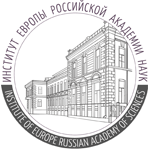institute of europe
the institute of europe of the russian academy of sciences
All-Russian Scientific and Practical Seminar
- 27 April 2022
On April 27, 2022, Valery P. Zhuravel and Diana S. Timoshenko, Research Fellows at the Center for Arctic Studies, Department of Country Studies, IE RAS, took part in the All-Russian Scientific and Practical Seminar "The WHITE-BLACK SEA: Conceptual elements of Russia’s national idea and its competitive advantages in the twenty-first century", held by the Institute of Europe, the Russian Academy of Sciences and the Northern (Arctic) Federal University named after M.V. Lomonosov (NArFU).
It was the first official meeting in a series of Arctic seminars named after Valentin P. Fedorov. The agreement on their holding was reached between the IE RAS and NArFU on February 16, 2022, during the conference "Valentin P. Fedorov – The Scientist, The Politician, The Citizen, and His Legacy" (http://en.instituteofeurope.ru/scientific-life/news/item/16022022-eng )
The scientific and practical seminar was opened by the Vice-President for Social Affairs and Educational Work of NArFU, Doctor of Philosophy Sergey E. Sorokin.
Head of the Center for Arctic Studies IE RAS Valery P. Zhuravel in the report "Arctic Security Strategy" drew attention to the peculiarities of aggressive behaviour of NATO in the Arctic region under the conditions of Western sanctions pressure on Russia. He stressed the need to step up the efforts to improve the composition and structure of the Armed Forces of Russian Federation, other troops, military formations, and bodies in the Arctic zone, equipping them with modern weapons, military and special equipment adapted to Arctic conditions.
Senior Research Associate of the Center for Arctic Studies IE RAS Diana S. Timoshenko presented the report "The Arctic tourism development prospects under the EU sanctions pressure and in the context of the UNWTO withdrawal", in which she highlighted the features of tourism development, under the current geopolitical instability. Separately, the researcher spoke on Russia's withdrawal from the World Tourism Organization, of which Russia has been a member since 1975. It was noted that Guatemala, Lithuania, Poland, Slovenia, and Ukraine were the initiators of Russia's membership suspension. Dr Timoshenko highlighted that tourism is considered a tool for reducing the conflict potential of civilisational development in the northern territories. This statement aroused particular interest among scientists and participants of the event.
A broad discussion took place in the second part of the seminar. Scientists spoke on Russia's national idea peculiarities of the third decade of XXI century.
The event was moderated by Artem V. Makulin, PhD, Acting Head of Philosophy and Sociology Department of the Northern (Arctic) Federal University (NArFU).

